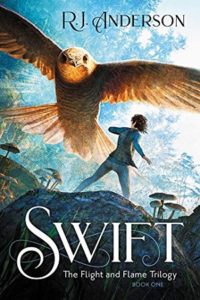The daughter of a preacher who read Tolkien and Lewis aloud to his children, R. J. (Rebecca) Anderson grew up daydreaming about Narnia and Middle-Earth, watching Doctor Who from behind the sofa, and hanging out in her brothers’ comic book shop. Now she writes novels about knife-wielding faeries, weird science, and the numinous in the modern world.
Her latest book is Swift (Enclave), the first book in the Flight and Flame Trilogy: To save her people, a wingless girl must learn to fly. Deadly threats and shocking revelations await Ivy as she ventures into a strange new world, uncovers long-buried secrets about her family’s past, and finds that no one—not even herself—is entirely what they seem.
In this exclusive interview, Rebecca tells us about the characters who inhabit her world, explains the most challenging aspects of world-building, and reveals the spiritual themes at the heart of the novel.
RELATED: 40 Essential Christian Speculative Authors
Your main character, Ivy, is “a piskey girl, born without wings and raised underground.” Tell us a little about the piskey people. Do they normally have wings, and live above ground?
As we learn in the early chapters of the novel, the piskeys of Cornwall used to live in hidden villages on the surface, but they moved underground with their mining cousins, the knockers, to escape their enemies and the dangers of the modern world. So Ivy’s been raised the same as all the other piskeys her age, with the same rules and expectations.
But all the other piskey girls and women have beautiful moth-like wings that they can use to fly up shafts and around tunnels, while Ivy’s being born wingless is seen as a defect that limits her and causes others to pity her. She’s spent her whole life longing to fly but it seems like she never will, so she’s had to work extra hard at other skills (like rock climbing) to compensate.
Richard is a trapped faery who wants Ivy’s help in escaping the Delve’s dungeon. What is the Delve? What inspired your story?
The Delve is the name for the abandoned tin mine where Ivy and her fellow Cornish piskeys live. Richard (not his real name, but Ivy overhears him reciting a speech from Shakespeare’s Richard III and assumes that it is) ends up in the Delve’s dungeon after being captured snooping around on the surface–the piskeys are extremely suspicious of outsiders.
The story actually began with the title, which was suggested by a reader on Twitter when I asked what my next book should be called! There were a lot of words tossed around, but that was the first one that brought a specific character and idea to mind.
I liked the concept of “swift” as both a bird and a term for speed and agility, and the idea that Ivy might actually not be swift compared to others, and might have to overcome that in the story, was especially compelling to me. I’ve always been interested in stories about characters who are outsiders or living with a disability, especially as I didn’t read a lot of stories growing up that allowed disabled or disfigured characters to take center stage and not be treated as doomed objects of pity, or portrayed as creepy villains like the Phantom of the Opera or Captain Hook.
What was the most challenging part of developing this magical world?
 It helped that I’d already established some background in my No Ordinary Fairy Tale trilogy, which ends about a year prior to Ivy’s story (though you don’t have to have read Knife, Rebel, or Arrow to understand Swift). So a lot of the basic world-building ideas were the same — such as magic being the innate and God-given power given to sub-angelic beings like faeries and piskeys, and humans being the only ones blessed with real and lasting creativity – but the big challenge was to make Ivy’s people and environment feel fresh and different from that of the British and Welsh faeries I’d written about before.
It helped that I’d already established some background in my No Ordinary Fairy Tale trilogy, which ends about a year prior to Ivy’s story (though you don’t have to have read Knife, Rebel, or Arrow to understand Swift). So a lot of the basic world-building ideas were the same — such as magic being the innate and God-given power given to sub-angelic beings like faeries and piskeys, and humans being the only ones blessed with real and lasting creativity – but the big challenge was to make Ivy’s people and environment feel fresh and different from that of the British and Welsh faeries I’d written about before.
Cornwall has its own distinct lore and history, so I dug into old Cornish folktales to find out about the piskeys, knockers and spriggans (which rhymes with “pigeons,” believe it or not!) and books about the tin mining boom and bust of the 19th and 20th centuries. I also took a research trip to Cornwall with my husband to explore some of the sites I was writing about, like the capital city of Truro (which plays a large part in Swift), and Redruth, where my own maternal grandparents were born and raised before emigrating to Canada.
This is book one in the Flight and Flame Trilogy. How does this novel fit into the bigger picture of the series?
This first book is crucial to introducing Ivy as a character, and setting her off on a search for truth and purpose that takes her the whole three books to complete. At the start of her journey she’s a bit like Naomi in the book of Ruth–someone who’s suffered a lot of hard knocks and painful losses in her life, and is struggling with bitterness and frustration because of that.
When “Richard” comes along and offers her a hope she’d never dreamed of, she’s afraid to take it. But growing up with a congenital disability and poor health compared to other piskeys has made Ivy more determined, more ready to think outside the box of her people’s traditions and superstitions, than she would have been if her life had been easier.
And as she takes her first steps of faith and courage, and starts to reach beyond her limitations and other people’s expectations, she also begins to realize how wrong some of the things she’s always believed about herself and her fellow piskeys really are.
So between the shocking and life-changing discoveries Ivy makes and the characters like “Richard” that she meets in the course of the book, Swift is essential to setting up the events of Nomad and Torch (books two and three in the series, coming out in November 2020 and February 2021). But Swift also reads as a full and hopefully satisfying adventure in itself, because I like readers to come away feeling like they’ve read a proper story and not just the beginning of one.
What spiritual themes are you exploring in Swift that you’d like readers to reflect on?
In this first book, the focus is on the way that false assumptions and false teachings can keep us from truth that could (and should!) transform our lives. Ivy’s people are ruled by her aunt Betony, a proud, stubborn woman who believes she knows what is good and best for everyone.
But as Ivy starts to question and probe deeper into what her aunt is doing, she discovers ways she’s been misled about the nature of her world, her people’s role in history, and a far more deadly threat to the Delve than sneaky faeries or hungry spriggans.
I know many parents of children and teens are concerned about books that seem to be promoting rebellion. But Swift is not a book about rejecting good, godly leadership, it’s a book about holding what our authorities are telling us up to the light of truth, and doing what’s right even if it’s hard and scary and painful to do so.
The relationship between Ivy and Betony becomes something of a Moses and Pharaoh struggle, where one is determined to hold tight to the piskeys of Cornwall while the other wants to set them free… and that idea leads us into the rest of the trilogy. It’s really a story about the difference between self-centered fear and the Satanic desire to cling to power, and the kind of selfless, sacrificial faith that makes a true, Christlike leader.
Thanks for these great questions and giving me an opportunity to answer them! I hope families will enjoy Swift and its sequels, and welcome letters from parents and teens who have read these stories.
Visit R.J. Anderson’s Author Page:
https://www.familyfiction.com/authors/r-j-anderson/
Swift
The Flight and Flame Trilogy #1
R.J. Anderson
Enclave Publishing
Buy the book from our store!



